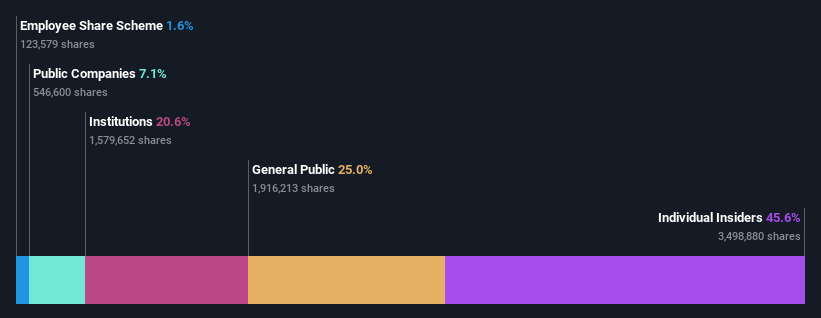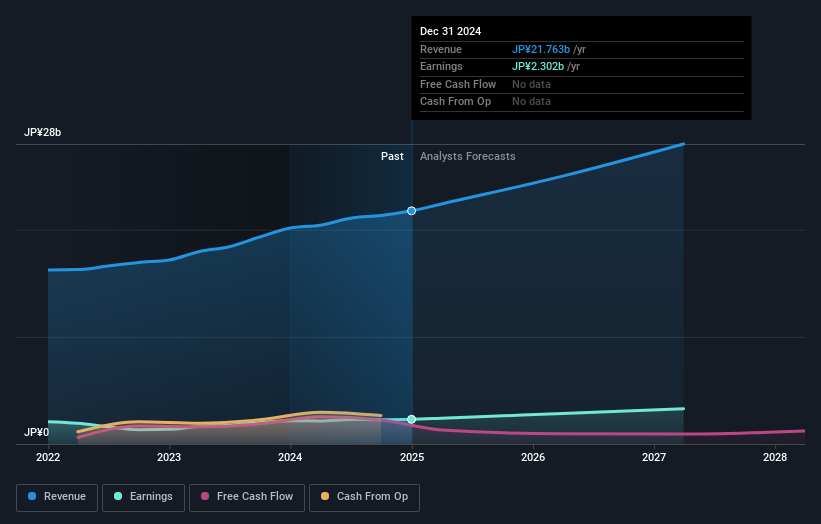The recent JP¥3.8b market cap decrease is likely to have disappointed insiders invested in Nihon Trim Co., Ltd. (TSE:6788)
Key Insights
- Significant insider control over Nihon Trim implies vested interests in company growth
- A total of 3 investors have a majority stake in the company with 56% ownership
- 21% of Nihon Trim is held by Institutions
A look at the shareholders of Nihon Trim Co., Ltd. (TSE:6788) can tell us which group is most powerful. The group holding the most number of shares in the company, around 46% to be precise, is individual insiders. In other words, the group stands to gain the most (or lose the most) from their investment into the company.
And following last week's 13% decline in share price, insiders suffered the most losses.
Let's delve deeper into each type of owner of Nihon Trim, beginning with the chart below.
Check out our latest analysis for Nihon Trim

What Does The Institutional Ownership Tell Us About Nihon Trim?
Many institutions measure their performance against an index that approximates the local market. So they usually pay more attention to companies that are included in major indices.
We can see that Nihon Trim does have institutional investors; and they hold a good portion of the company's stock. This suggests some credibility amongst professional investors. But we can't rely on that fact alone since institutions make bad investments sometimes, just like everyone does. If multiple institutions change their view on a stock at the same time, you could see the share price drop fast. It's therefore worth looking at Nihon Trim's earnings history below. Of course, the future is what really matters.

Hedge funds don't have many shares in Nihon Trim. Shinkatsu Morisawa is currently the company's largest shareholder with 44% of shares outstanding. Meanwhile, the second and third largest shareholders, hold 6.2% and 5.6%, of the shares outstanding, respectively.
After doing some more digging, we found that the top 3 shareholders collectively control more than half of the company's shares, implying that they have considerable power to influence the company's decisions.
While it makes sense to study institutional ownership data for a company, it also makes sense to study analyst sentiments to know which way the wind is blowing. There is a little analyst coverage of the stock, but not much. So there is room for it to gain more coverage.
Insider Ownership Of Nihon Trim
While the precise definition of an insider can be subjective, almost everyone considers board members to be insiders. Management ultimately answers to the board. However, it is not uncommon for managers to be executive board members, especially if they are a founder or the CEO.
Most consider insider ownership a positive because it can indicate the board is well aligned with other shareholders. However, on some occasions too much power is concentrated within this group.
It seems insiders own a significant proportion of Nihon Trim Co., Ltd.. Insiders have a JP¥12b stake in this JP¥26b business. It is great to see insiders so invested in the business. It might be worth checking if those insiders have been buying recently.
General Public Ownership
The general public-- including retail investors -- own 25% stake in the company, and hence can't easily be ignored. This size of ownership, while considerable, may not be enough to change company policy if the decision is not in sync with other large shareholders.
Public Company Ownership
We can see that public companies hold 7.1% of the Nihon Trim shares on issue. It's hard to say for sure but this suggests they have entwined business interests. This might be a strategic stake, so it's worth watching this space for changes in ownership.
Next Steps:
It's always worth thinking about the different groups who own shares in a company. But to understand Nihon Trim better, we need to consider many other factors. For instance, we've identified 1 warning sign for Nihon Trim that you should be aware of.
If you would prefer discover what analysts are predicting in terms of future growth, do not miss this free report on analyst forecasts .
NB: Figures in this article are calculated using data from the last twelve months, which refer to the 12-month period ending on the last date of the month the financial statement is dated. This may not be consistent with full year annual report figures.
Have feedback on this article? Concerned about the content? Get in touch with us directly. Alternatively, email editorial-team (at) simplywallst.com.
This article by Simply Wall St is general in nature. We provide commentary based on historical data and analyst forecasts only using an unbiased methodology and our articles are not intended to be financial advice. It does not constitute a recommendation to buy or sell any stock, and does not take account of your objectives, or your financial situation. We aim to bring you long-term focused analysis driven by fundamental data. Note that our analysis may not factor in the latest price-sensitive company announcements or qualitative material. Simply Wall St has no position in any stocks mentioned.
- ELTP
- 0.4272
- -2.89%
 Index Options
Index Options CME Group
CME Group Nasdaq
Nasdaq Cboe
Cboe TradingView
TradingView Wall Street Journal
Wall Street Journal